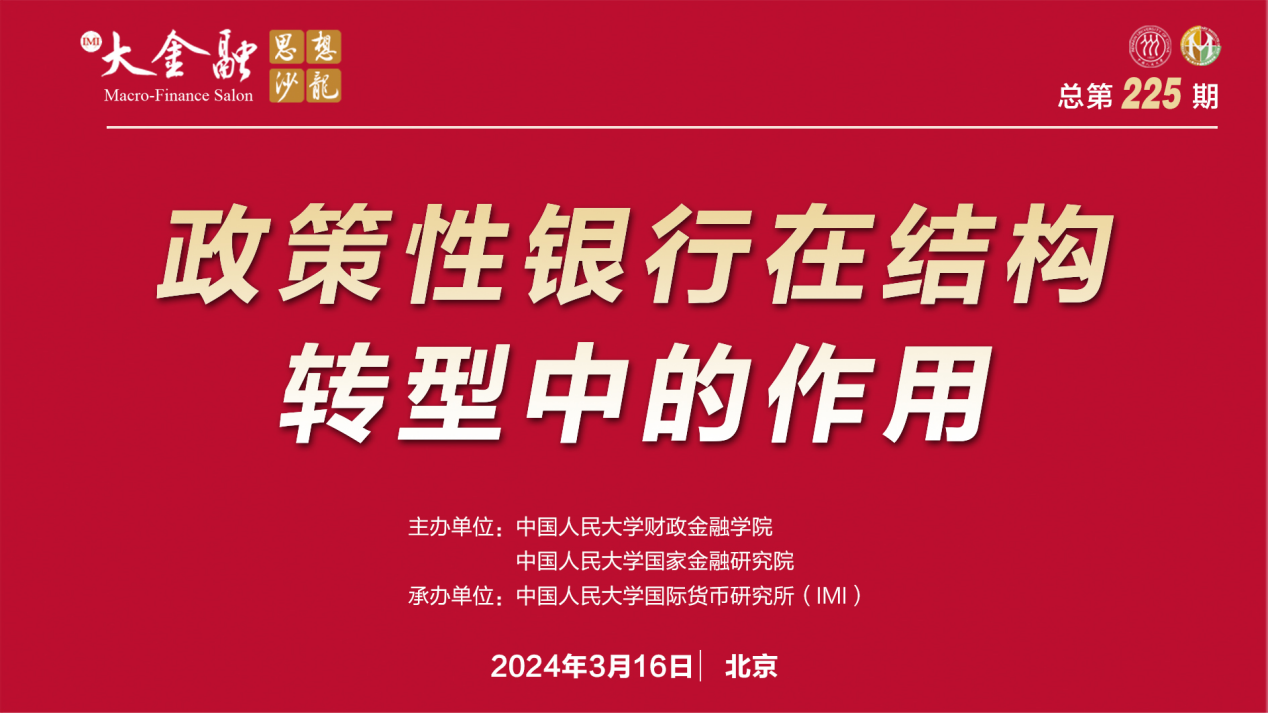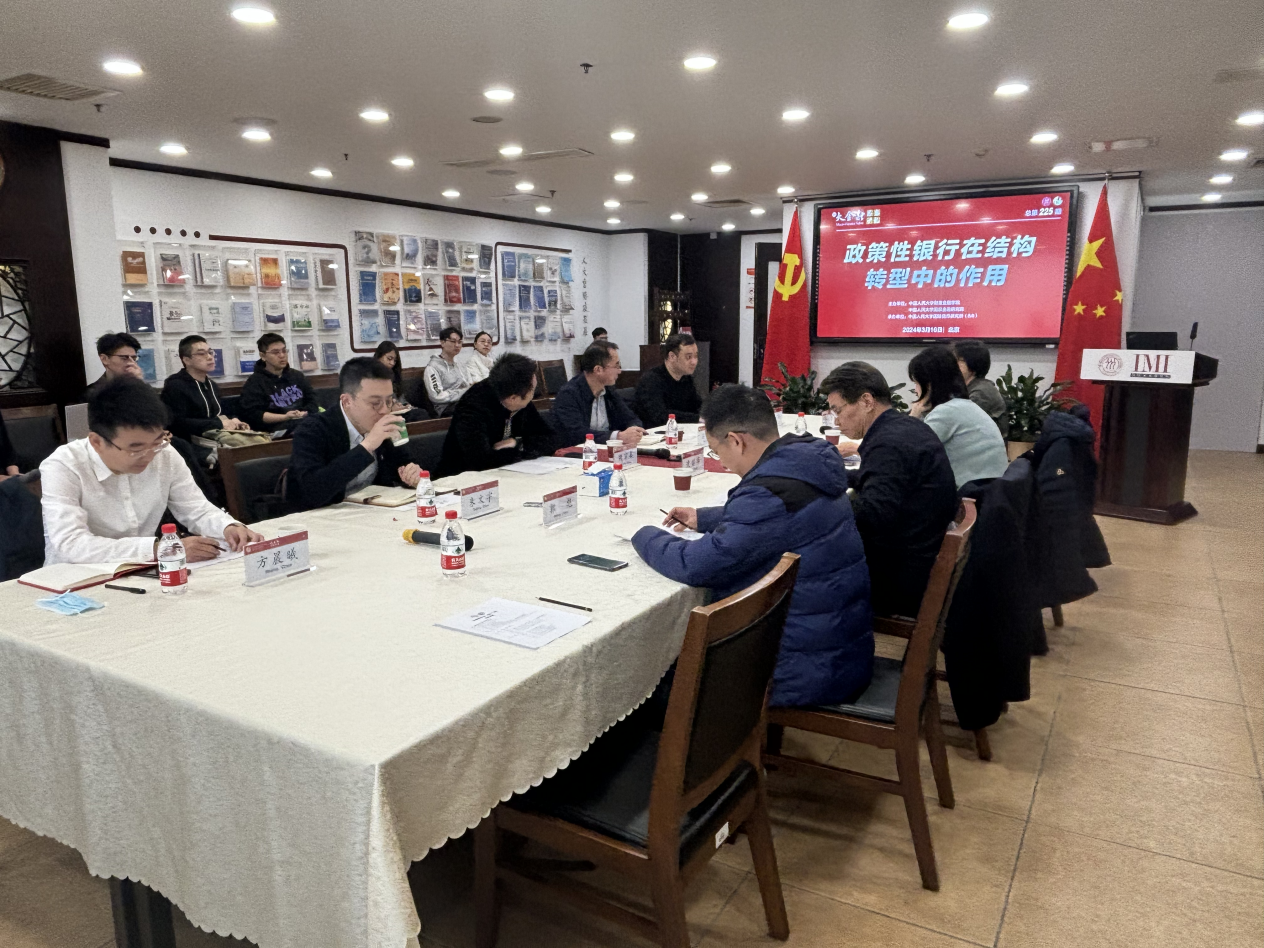Macro-Finance Salon (No. 225): the Role of Policy Banks in Structural Transformation
2024-04-18 IMI

On March 16, 2024, the Macro-Finance Salon (No. 225), co-organized by the School of Finance and the National Finance Academy of Renmin University of China (RUC) and hosted by the International Monetary Institute (IMI) of RUC, was successfully held in Beijing, centered on the theme “the Role of Policy Banks in Structural Transformation”.
Li Xiaowei, Deputy General Manager of the Strategic Planning Department of the Export-Import Bank of China and Deputy Director of the Belt and Road Institute of Finance, Shi Zongying, Director of the Rural Finance Development Research Institute of the Agricultural Development Bank of China, Qian Zongxin, Associate Dean of the School of Finance of Renmin University of China, Guo Biao, Professor of the School of Finance of Renmin University of China and Associate Dean of the National Institute of Finance, Cheng Xu, Research Manager of the Export-Import Bank of China and the Belt and Road Research Institute, Fang Chenxi, Deputy Director of the Financial Department of the Research Institute of the Agricultural Development Bank of China, and Zhu Wenyu, Associate Professor of the School of Finance of Renmin University of China, attended the meeting and delivered speeches. The salon was presided over by Tu Yonghong, Deputy Director of the International Monetary Institute and Dean of the Yangtze River Economic Zone Research Institute of RUC.
During the keynote speech session, participants pointed out the crucial role of policy banks in promoting structural transformation and achieving high-quality growth. For instance, in recent years, the proportion of policy-oriented businesses at the Export-Import Bank of China has risen to over 60%, particularly showcasing notable structural features in supporting the development of foreign trade, jointly constructing the Belt and Road initiative, and promoting advanced manufacturing. China is currently at a critical juncture. Structural monetary policies are set to become vital supporting measures for industrial upgrading. Policy banks are not only a product of structural transformation but also a measure to further optimize structures. It is suggested that policy banks should precisely focus on businesses that commercial banks are unable or less adept at handling, thereby complementing and synergizing with commercial financial institutions in areas where market resource allocation is insufficient, and where efficiency and fairness are unbalanced, to avoid disorderly competition and jointly promote the healthy financial markets.
Participants highlighted that relying on national strategies and market demands, policy banks play an important role in handling areas that commercial banks find challenging, such as tasks involving national security, special policy support, and some business activities that are neither market-oriented nor administrative. In the integration of an efficient market and an active government, the functions of policy banks can be summarized as bridges between the government and the market, tools for implementing strategies, means for macroeconomic regulation, channels for policy support, and benchmarks for guiding the market. Participants believe that national policy support is crucial for further strengthening the strategic positioning of policy banks and achieving long-term sustainable development. This includes ensuring appropriate business scope and moderate credit scale to better match the comprehensive and multi-level financial demands. Additionally, in situations of significant financial and risk control pressures, it is crucial for the government to provide support in areas such as low-cost funding sources, capital infusion, and tax incentives to create favorable conditions for policy banks to fulfill their duties more effectively.
Following this, participants engaged in in-depth discussions regarding the role of policy banks in structural transformation.
Qian Zongxin emphasized that the challenges faced by policy banks are related to their mission support and functional positioning. From an economic perspective, failure to perform well implies market failure. There is a debate within the financial system about choosing market or banks to serve the real economy. For example, the division of labor and cooperation between exchanges and banks remains unclear when it comes to the support for small and medium-sized strategic emerging industries. Additionally, the relationship between policy finance and the market in nurturing small and micro-enterprises is worth attention. Venture capital plays a pivotal role in identifying value and market dynamics at the micro level, while policy finance provides macro-level support through medium to long-term lending. Investigating how these two forces collaborate to foster the growth of national unicorns and emerging strategic sectors is imperative.
Guo Biao believes that policy banks have significant advantages in economic structural transformation. Currently, we are exploring the twin peaks model of direct and indirect financing. Under this model, the United States represents direct financing, while Germany represents indirect financing. German policy banks have played an important exemplary role in supporting the real economy. In the context of exploring the twin peaks model, China has overlooked the importance of policy banks, mainly focusing on the capital market and commercial banks. We should fully recognize the important role of policy banks in supporting and underpinning the development of new quality productive forces. At the same time, we should explore boldly, clarify business boundaries, and improve incentive mechanisms.

Zhu Wenyu elaborated on the role of policy financial institutions in structural transformation from a risk perspective. Policy banks demonstrate the capability to assume risks in terms of institutional scale and asset quality. Regarding credit risk, enterprises face certain risks during the process of technological innovation. Some commercial banks are unable to sustain credit support due to capital supervision or limitations in asset quality. However, policy banks should possess advantages in this regard. Regarding political risk, intensified competition among major countries has increasingly highlighted international political risks faced by businesses. From the perspectives of national strategy, national security, and future technological innovation, policy financial institutions should leverage their strengths in this area. From the viewpoints of asset and liability management and bank liquidity management, policy banks have simpler liquidity management compared to commercial banks due to the characteristics of their liabilities. Moreover, in terms of risk digestion and absorption, policy financial institutions can play a significant role in effectively resolving risks related to real estate and local government debt, thanks to their scale and institutional features.
Macro-Finance Salon is a high-level academic salon initiated by International Monetary Institute (IMI) at Renmin University of China. The salon, rooted in China’s experience and closely following international frontiers, provides a high-level, professional and open academic exchange platform for the study and practice of Macro-Finance, as well as its disciplinary program in the new era, while carrying out in-depth research on Macro-Finance theory, policy and strategy. Professor Huang Da is the initiator and designer of the concept of “Macro-Finance” in China. At the turn of the century, he responded to the new challenges and requirements posed by economic and financial globalization to China’s financial discipline and reconstructed the financial discipline framework based on China’s reality. He initiated and systematically designed the “Macro-Finance” discipline system. Generations of researchers have continued to inherit and carry forward this system, integrating macro and micro financial theory, which systematically regards finance and real economy as a whole. A major theoretical innovation system with distinct characteristics of the Renmin University of China has gradually formed on this basis.
